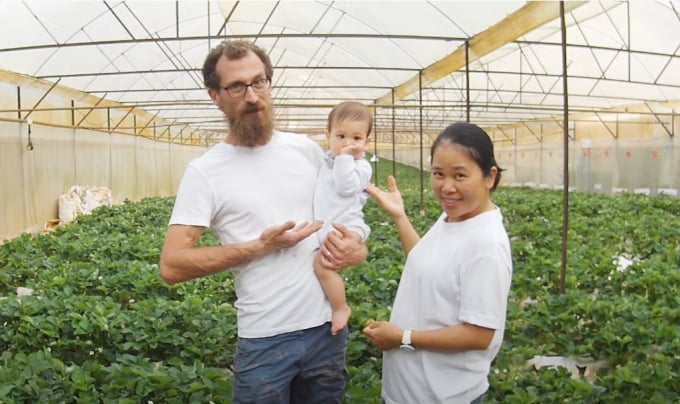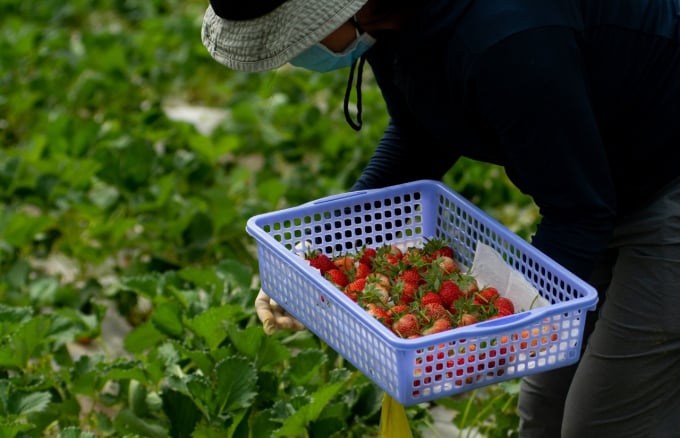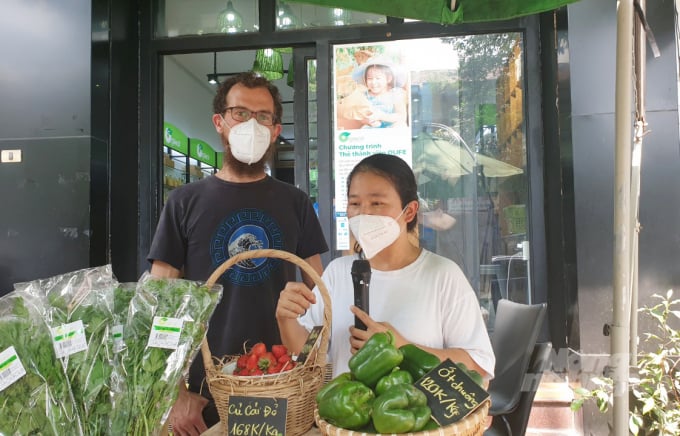May 31, 2025 | 19:10 GMT +7
May 31, 2025 | 19:10 GMT +7
Hotline: 0913.378.918
May 31, 2025 | 19:10 GMT +7
Hotline: 0913.378.918

Marco, Hue and their son in an organic vegetable garden in Da Lat. Photo: Organica.
Tran Thi Hue and Marco Kranz are a Vietnamese-German couple. Marco's previous job had nothing in relation with agriculture, because he was an expert in information technology. In contrast, Hue is a true farmer. She has lived and worked in Da Lat for many years with the main job being a consultant on production techniques of high-grade vegetables for farmers.
Marco worked in Germany, Hue lived in Vietnam, both in vastly different fields, so they didn't have the opportunity to meet each other in real life but online through a dating app. Through conversations, they found that they share many similarities, because despite working in information technology, Marco was also very interested in agriculture.
When they got to know each other, Marco decided to travel to Vietnam and visit Hue. The first place in Vietnam that Marco visited was Hanoi. When he first arrived in this city, Marco felt familiar, similar to what he felt in Italy decades ago (Marco's mother is Italian). Vietnamese dishes quickly conquered Marco's taste, making him feel closer to this country.
After getting married, Marco returned to his wife's hometown to celebrate Lunar New Year. Despite the language difference, Marco was treated by Hue's family as a member of the family, not a foreigner. Everytime Marco went out, he was greeted by neighbors and friends of Hue's parents, in a very friendly and wholesome way, like the Italians.
That's why when Hue invited Marco to return to Vietnam to work in agriculture, he immediately agreed. Previously, Hue and Marco had seen the potential of the combination of an agriculture expert and an information technology expert in developing a farm. Marco also wanted to make the best foods with his own hands, for his small family first, then to meet the needs of society.
Back in Da Lat, Hue and Marco went to find and rent a small garden with a greenhouse, 2,500 m2 in width, and started on organic production. This garden was previously planted with flowers. Because the flowers could not be sold due to the impact of the Covid-19 pandemic, the previous garden owner stopped investing in taking care of them and only watered the plants for a long time.

Harvesting Hana strawberries in Max Organic Farm. Photo: Organica.
So, when Hue and Marco rented the garden, the chemical residues in the soil were mostly gone. Immediately after taking over the garden, Hue planted legumes to help the garden soil become more suitable for organic production. They named the farm after their little boy, Max Organic.
When the soil was improved, Hue ordered, from Moc Chau (Son La), strawberry varieties originating from Japan that Vietnamese farmers call "Hana" strawberry. She grows these strawberries on an area of about 1,000 m2. The remaining area is for growing vegetables including sweet peppers, lettuce, red radish...
All of these vegetables are grown organically, without the use of fertilizers or chemicals. The eradication of pests and harmful insects in the garden is the result of natural enemies and hand-catching. According to Organica, Max Organic is one of the rare strawberry gardens in Vietnam that is being grown organically.
Because strawberries are very difficult to grow with many pests and diseases, in the beginning, Max Organic faced a lot of difficulties when pests developed quickly while the natural enemies (purchased from a company specializing in the production of natural enemies) were yet to adapt to the environment in the garden. However, thanks to her deep knowledge of agriculture, Hue remained composed, accepted losses in yield and persisted in catching pesticides by hand while waiting for natural enemies to adapt and develop.
It took 3-4 weeks for Max Organic's strawberry garden to establish a balance between natural enemies and harmful pests before entering into a stable development. Hue still monitors the garden daily to supplement natural enemies periodically or as soon as the density of pests increases.
Last December, the first fresh batch of strawberries from Max Organic were put on sale in the Organica system. In order to bring these juicy and sweet strawberries to the market, alongside great efforts in organic production, Hue and Marco had to spend a lot of effort on packaging and preserving, because Hana strawberries are very soft, easily crushed during transportation if not packed carefully. In return, the organically produced strawberries by their own hands have been well received and praised by customers.

Marco and Hue introducing their own organic products. Photo: Thanh Son.
Max Organic Farm is also special owing to the fact that it is that based on Hue's specific requirements for temperature, humidity and light for the garden, Marco applied his knowledge of information technology and designed his own sensor system to measure temperature, light, soil moisture and air humidity.
With this system, the garden always ensures the right humidity and temperature for the growth of plants. Thanks to the application of information technology, Hue and Marco are always able to monitor, control and operate Max Organic Farm's activities easily even when they are far away. In addition, Marco also designed an underground drainage system so that irrigation water in the surrounding gardens does not penetrate into the Max Organic Farm's garden, thereby preventing the risk of chemical residues from other gardens.
Thus, Max Organic is undoubtedly a farm that has successfully combined technology and organic production.
Currently, in addition to strawberries, many vegetables produced by Max Organic's organic method have been sold in the Organica system and are well received by customers. Recently, the Farm took samples and sent them to the Netherlands for testing according to European organic standards, and all criteria were met. However, Max Organic still needs to bide their time to carry out the necessary procedures for an organic certification.
In the immediate future, Hue and Marco will cooperate with a partner with a large land bank in Da Lat to build an organic production farm on a larger scale, with more output. By then, the application of new technologies to production as well as the development of packaging and preservation technology will become easier to further improve the quality of their organic vegetables and fruits.
Translated by Nguyen Hai Long

(VAN) Seafood by-products are opening a new path, combining green growth and technological innovation to enhance the industry's value.

(VAN) Mr. Nguyen Thanh Cong, Vice Chairman of the Son La Provincial People's Committee, reflects on Son La’s journey from barren hills to fruitful orchards after a decade of hard work.

(VAN) FAO’s Director-General addresses the 5th Baghdad International Water Conference.
/2025/05/26/1716-4-nongnghiep-191706.jpg)
(VAN) Chain linkages, technological innovation, and raw material zoning are three strategic pillars for the coconut industry to strongly develop and elevate its position on the global agricultural map.
![Advanced mariculture – an inevitable trend: [4] Accompanied by scientists](https://t.ex-cdn.com/nongnghiepmoitruong.vn/608w/files/sohk/2025/05/13/1941-pgsts-vo-van-nha-140958_717.jpg)
(VAN) According to Assoc. Prof. Dr. Vo Van Nha, Director of the RIA III, the development of advanced offshore mariculture is no longer an option but an essential path for Vietnam’s fisheries sector.

(VAN) Vietnam is intensifying the development of mollusk farming areas that meet international standards, aiming for sustainable growth and enhancing its export position in the global seafood market.
![Advanced mariculture – an inevitable trend: [3] Policy-driven momentum](https://t.ex-cdn.com/nongnghiepmoitruong.vn/608w/files/doanhtq/2025/05/21/0104-0616-0348-nuoi-bien-170339_789.jpg)
(VAN) To ensure the success of offshore mariculture that uses advanced technologies, it is essential to establish supportive policies that inspire both individuals and enterprises to invest with confidence.